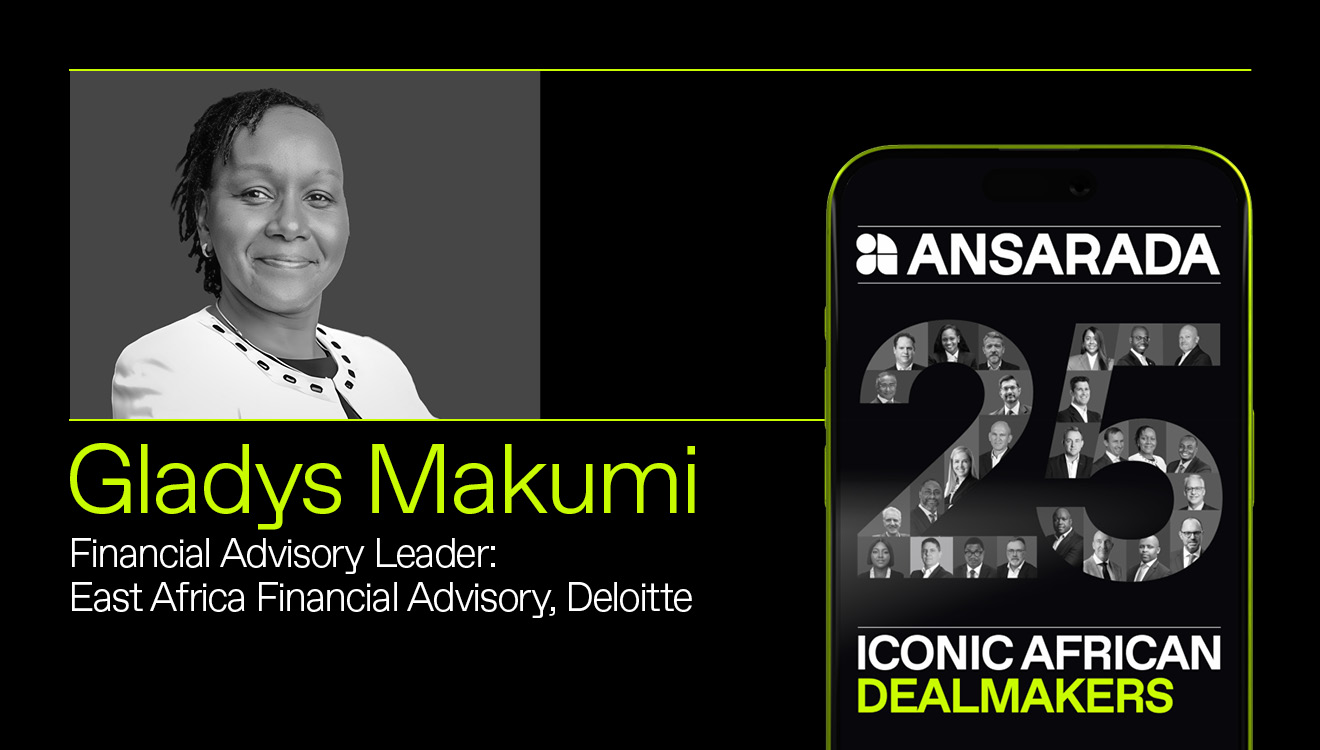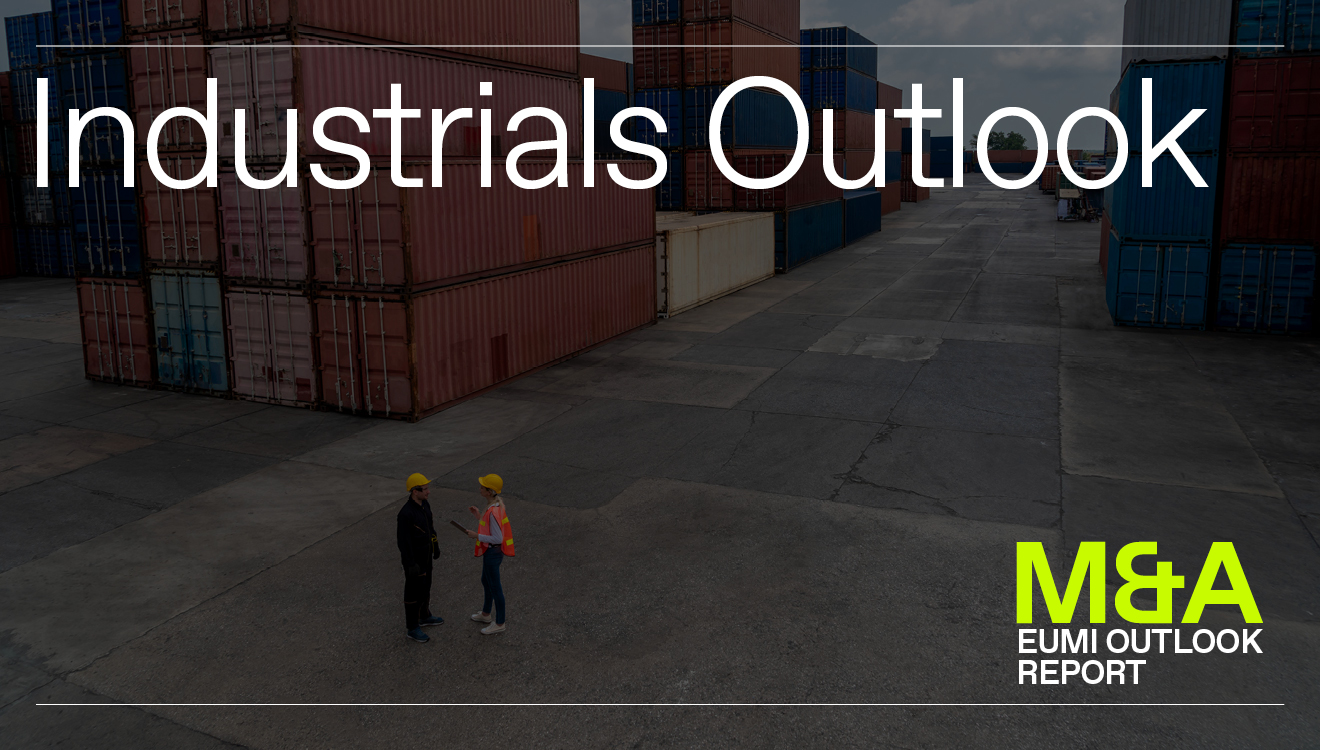Gladys Makumi on integrity, innovation, and shaping the future of deal-making in East Africa
Gladys Makumi leads the Financial Advisory Team in Deloitte East Africa. She has over 25 years of experience in undertaking financial advisory assignments ranging from due diligence assignments, business valuations, feasibility studies to M&A advisory services. These assignments have required analytical skills, financial modelling and forecasting and critical risk analysis.
By AnsaradaThu Apr 24 2025Mergers and acquisitions, Due diligence and dealmaking, Advisors

Gladys Makumi leads the Financial Advisory Team in Deloitte East Africa. She has over 25 years of experience in undertaking financial advisory assignments ranging from due diligence assignments, business valuations, feasibility studies to M&A advisory services. These assignments have required analytical skills, financial modelling and forecasting and critical risk analysis.
Her wealth of experience spans from financial services (including banking, fintech and insurance sectors), manufacturing, healthcare, real estate, agro-processing, business and consumer services, aviation to telecommunications sectors, having advised various clients ranging from listed companies, blue chip companies, private equity firms, development finance institutions to small and medium enterprises.
This interview explores Gladys’ journey, highlighting key milestones, significant transactions, and his vision for the future of M&A in East Africa and beyond.
What initially inspired you to pursue a career in mergers and acquisitions, corporate finance, and investment banking?
From the outset, I had a clear idea of what I did not want to do in the business world. While pursuing my Bachelor of Commerce degree, I knew that accounting was not the right path for me—I was drawn to finance. My interest lay in understanding businesses from a forward-looking perspective, analysing what drives success or failure rather than simply reviewing historical financials. That curiosity was sparked during my university years.
Upon graduation, direct entry positions into corporate finance were scarce in our jurisdiction, leading me to take on a brief stint in audits and consulting projects. However, less than six months later, Deloitte had an opening in corporate finance. I applied, was selected, and began my career as a business analyst. It was an exciting opportunity to gain firsthand exposure to various aspects of M&A, and that was the start of my journey in this field.
What core values or principles have guided you through the complexities of dealmaking across East Africa?
Integrity is paramount—it is essential to maintain transparency and accuracy of information throughout the transaction process, whether representing the buy or sell side. Additionally, openness and frankness in communication are crucial.
Collaboration plays a key role, as deals require effective teamwork across multiple stakeholders. Respecting differing perspectives fosters constructive discussions, ultimately leading to better outcomes. Lastly, curiosity has been a guiding principle—an inquisitive mindset allows for deeper insights and innovative problem-solving in negotiations and deal structuring.
Looking back on your career, is there a particular deal that stands out as career-defining?
One deal that stands out was Allianz’s acquisition of Jubilee’s interests in our market. This was a complex, multi-jurisdictional transaction spanning Kenya, Uganda, Tanzania, Burundi and Mauritius. The phased approach saw Allianz first enter the Kenyan market before expanding across the region.
The complexity lay in the fact that it was a carve-out deal—Allianz was acquiring the short term insurance business rather than the entire entity. Some of the businesses did not have standalone financial reports, making structuring the transaction particularly intricate.
Working closely with the Allianz team and our colleagues in Munich, we had to navigate confidentiality requirements, given that we were dealing with a listed and regulated entity. We collaborated extensively with legal teams to ensure seamless execution. A significant milestone was completing the first closing during the COVID-19 pandemic in 2020. Seeing the final signatures on paper, despite the complexities and challenges, was an incredibly rewarding moment.
M&A transactions often have broader socio-economic implications. How do you view the impact of major deals in East Africa, particularly in terms of job creation and community development?
Over the years, I have gained a greater appreciation for the full lifecycle of a deal and its broader impact. A frequent question is whether mergers truly exist or if they are, in reality, acquisitions. The reality is that post-acquisition, businesses need to operate efficiently to remain sustainable, which is crucial not only for employees but also for the entire supply chain.
I have worked on transactions where financial inclusion was a key outcome—bringing more people into the formal financial services sector and positively impacting economic participation. Additionally, in certain deals, competition laws required commitments to retain employees for a specified period, prompting businesses to plan for reskilling and redeployment rather than job cuts.
Over the past 25 years, how has the M&A landscape evolved in East Africa? What key trends have emerged?
Initially, most M&A activity involved multinational corporations entering or exiting the market, with transactions largely occurring between multinational buyers and publicly listed companies. However, about fifteen years ago, private equity firms began playing a more significant role, particularly in transactions involving founder-owned businesses seeking growth capital or succession solutions. Many of these deals also focused on governance enhancements and professionalizing management structures.
Economic shifts have also influenced dealmaking. Kenya’s GDP growth, increased financial inclusion, and evolving banking regulations have shaped the types of transactions taking place. Fintech and telecommunications have become prominent sectors for M&A, while regional integration through the East African Community (EAC) has driven cross-border expansion deals.
What unique challenges do dealmakers face in East Africa, and how have you adapted to them?
Several challenges stand out. A decade ago, currency volatility was not a major concern, but in recent years, fluctuations—particularly in the Kenyan shilling—have introduced complexities. Previously, currency stability meant minimal need for hedging, but today, it is a crucial consideration in deal structuring.
Government policy also plays a significant role. Kenya’s debt position has influenced macroeconomic stability, and taxation remains a challenge. Our tax laws are open to interpretation, leading to increased compliance costs and uncertainty. As a result, many businesses establish holding structures outside the region to manage tax inefficiencies.
Additionally, data availability has historically been a constraint. While improving, there remains a need for more robust economic and industry-specific data to support informed decision-making. To address this, we initiated the development of East African macroeconomic outlook reports to provide deeper insights for investors and businesses.
Looking ahead, what are your predictions for M&A activity in East Africa? Which sectors are likely to drive deal volume and value?
Global economic shifts may prompt companies to focus more on localization, prioritizing specific jurisdictions rather than maintaining a fully global approach. Kenya, traditionally a services-driven economy, may need to reassess its positioning due to fiscal and operational challenges.
Investment is also diversifying, with countries like Uganda and Tanzania emerging as attractive destinations for deal activity. Healthcare is another sector to watch, particularly as international funding dynamics shift and Africa seeks to develop more resilient health systems. Additionally, technology will continue to drive deal flow, given the region’s growing prominence as a tech hub.
Finally, if you could offer one piece of advice to your younger self, what would it be?
I would encourage my younger self to nurture an even greater sense of curiosity— seeking to understand not just what happens, but why it happens. Keeping an open mind and focusing on problemsolving is key to navigating the dynamic world of corporate finance and M&A.


